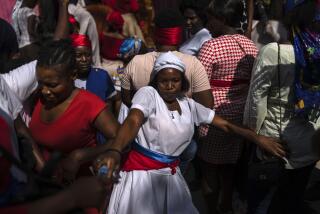Baby Doc, a President-for-Life, Becomes a Citizen-of-Nowhere
- Share via
SAN FRANCISCO — Who could have predicted a president-for-life without a place to rest his imperial head?
When I lived in Haiti in the mid-’50s, I was acquainted with Dr. Francois Duvalier, then a second-rate follower of the Griots movement--a spirit of resentment against mulatto domination. Indeed, there was a curious justice in this anger. On weekends my wife and I used to be guests at the Bourdon Country Club, where neither whites nor blacks were admitted as members. Once I went sailing with a beautiful young daughter of a former president of Haiti, who explained to me that there were no blacks in her family.
“You mean you are descended from an infinite series of mulattoes?”
“ Oui .”
Later, Duvalier transformed himself into Papa Doc, with his black suits evoking one of the wicked gods in the voodoo pantheon; he became both a gloomy torturer and a gleeful looter of the Haitian treasury. I happened to be in Haiti on a magazine assignment when President John F. Kennedy was shot. That night, Duvalier conducted a riotous party in the national palace, celebrating the downfall of his enemy, in whose doll he was said to have been sticking pins.
Around this time, the rumor in Port-au-Prince was that Papa Doc was going to declare himself king or emperor. There were posters depicting Jesus with his arm around the Haitian tyrant, captioned, “I have chosen him.” Instead, he settled in as president-for-life--although in fact, by establishing his slow-witted son in the succession, he was settling for an imperial regime after all.
When a man named Denis went into opposition, the Tonton Macoutes--the bogeymen, Papa Doc’s personal militia--roamed about killing anyone they found who had the same name, including an entire family and its dog. A poet was castrated. A doctor who was a former friend of Papa Doc was forced to drink his own urine, was tortured in front of his wife, and she in front of him, until American friends put pressure on the government to rescue him. After a few days in the hospital, and before he left the country, he was summoned to the national palace, where Papa Doc in his voodoo blacks intoned, “My dear friend! Had I but known!”
For poking about in my journalist’s way, I was stood up against a wall in Petionville by Macoutes who pointed their weapons at me and caressed me unpleasantly while they decided what to do. I talked fast. When, later, I complained to the chief of police of Port-au-Prince, he said, “Well, I guess they don’t like writers whose names are colors--Greene, Gold.” He was referring to Graham Greene’s book and movie “The Comedians,” which caused Papa Doc some grie.
When my pieces were published after that visit, I was banned from Haiti until Papa Doc died. In the amiable, inefficient way of Haiti my visa allowing me to return came in the form of a picture postcard of a beautiful Creole girl sent by Aubelin Jolicoeur, the Victor Louis of Haiti: “Herb! You may come back!”
Back I flew to this land of my dreams and nightmares, a place with more poets per square inch than North Beach or Greenwich Village, brilliant naive painters, witty intellectuals, charming music, a history of blood and courage, talents in exile who have nourished the French-speaking world with lawyers, doctors, writers--a skilled and assiduous people.
Jean-Claude Duvalier, Baby Doc, appointed president-for-life at age 19 by his dying father, did not seem to have the blood lust of his tutor. He wanted tourism and foreign investment. Indeed, billboards went up stating with variations: “My father made the cultural revolution. I will make the business revolution.”
Occasionally he would be moved in front of a microphone to read a speech in his surprisingly thin voice; mostly he preferred to play with his racing cars and other toys. On many visits I tried to meet him, waiting for invitations that were always coming tomorrow, surely tomorrow--but he was too busy for foreign journalists, except for a pair of pretty English young women, who quoted him as answering a question in this way:
Does being president-for-life interfere with your education?
“No, of course not. Not a night passes that I don’t fall asleep, my arms wrapped around my school books.”
In my most affectionate manner, I called him by the nickname Furniture Face in my articles. I reported on the export of Haitian blood to the United States as a kind of cannibalism (foreign business in Haiti generally required partnership with Duvalier family members or cronies). And I wrote about regularly meeting the family bagman, a debonair Englishman who came to Port-au-Prince every few weeks to carry away the money to Switzerland. Official letters denouncing me dealt only with the matter of the blood trade, saying two things: a) it wasn’t true and b) they weren’t doing it anymore.
The wife of the bagman only reproached me for reporting that I had seen rats in a hotel in Haiti. But when I brought my children to visit this place I love, she cooed and chattered with them in the sweetest manner possible. No reason for a bag-spouse to carry a grudge.
This is the cynicism and despair of Haiti; no one really cared what I or anyone else said about the place, unless it interfered with tourism. When the AIDS fright caused a deep sag in business, I was asked if I would like to be honorary consul for Haiti in San Francisco, since I had said that AIDS seems to be a homosexual problem and is certainly not a specifically Haitian disease. When I declined this honor, I was asked to offer it to a San Francisco politician, who also declined. She said that her “gay constituency” didn’t want to bear the onus of AIDS alone.
Which tells much of the story about how we see Haiti: as a symbol, as a scapegoat, not as a real place in the world. Oddly enough, its vitality, its realness, touches anyone who stays more than a few days and gets through the initial shock of extreme poverty. A few weeks ago I visited Martinque, a French department in the Caribbean, clean, scrubbed, with good roads and health services--and with no art or vitality comparable to that of Haiti. I wished to be with my friends in Port-au-Prince, Kenscoff and Jacmel--those who finally sent Jean-Claude Duvalier, together with his wife, Michelle, and family, to wander the face of the earth like the evil spirits of black magic.
Hey, Jean-Claude: Since you’re not so busy with matters of state, could we finally have that little chat?
More to Read
Sign up for Essential California
The most important California stories and recommendations in your inbox every morning.
You may occasionally receive promotional content from the Los Angeles Times.













